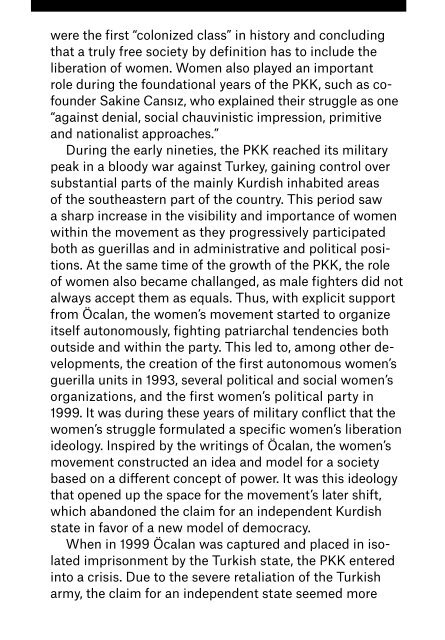Stateless Democracy
NWA5-Stateless-Democracy1.pdf?utm_content=buffer7beda&utm_medium=social&utm_source=twitter
NWA5-Stateless-Democracy1.pdf?utm_content=buffer7beda&utm_medium=social&utm_source=twitter
You also want an ePaper? Increase the reach of your titles
YUMPU automatically turns print PDFs into web optimized ePapers that Google loves.
were the first “colonized class” in history and concluding<br />
that a truly free society by definition has to include the<br />
liberation of women. Women also played an important<br />
role during the foundational years of the PKK, such as cofounder<br />
Sakine Cansız, who explained their struggle as one<br />
“against denial, social chauvinistic impression, primitive<br />
and nationalist approaches.”<br />
During the early nineties, the PKK reached its military<br />
peak in a bloody war against Turkey, gaining control over<br />
substantial parts of the mainly Kurdish inhabited areas<br />
of the southeastern part of the country. This period saw<br />
a sharp increase in the visibility and importance of women<br />
within the movement as they progressively participated<br />
both as guerillas and in administrative and political positions.<br />
At the same time of the growth of the PKK, the role<br />
of women also became challanged, as male fighters did not<br />
always accept them as equals. Thus, with explicit support<br />
from Öcalan, the women’s movement started to organize<br />
itself autonomously, fighting patriarchal tendencies both<br />
outside and within the party. This led to, among other developments,<br />
the creation of the first autonomous women’s<br />
guerilla units in 1993, several political and social women’s<br />
organizations, and the first women’s political party in<br />
1999. It was during these years of military conflict that the<br />
women’s struggle formulated a specific women’s liberation<br />
ideology. Inspired by the writings of Öcalan, the women’s<br />
movement constructed an idea and model for a society<br />
based on a different concept of power. It was this ideology<br />
that opened up the space for the movement’s later shift,<br />
which abandoned the claim for an independent Kurdish<br />
state in favor of a new model of democracy.<br />
When in 1999 Öcalan was captured and placed in isolated<br />
imprisonment by the Turkish state, the PKK entered<br />
into a crisis. Due to the severe retaliation of the Turkish<br />
army, the claim for an independent state seemed more<br />
improbable than ever. While in prison, Öcalan published<br />
new writings in which he took the critique of patriarchy<br />
set forth by the women’s movement to its full consequence.<br />
The concept of the nation-state, he claims, is an extension<br />
of patriarchy. The enslavement of women by men in<br />
the microstructure of the family — “man’s small state,” as<br />
Öcalan calls it — is replicated in the larger construct of the<br />
nation-state, whose myths of cultural unity and territorial<br />
belonging blind its subjects to the larger global capitalist<br />
condition in which the state is implicated. Öcalan terms<br />
the nation-state a “colony of capital,” and in line with the<br />
women’s movement, decides to reject the idea of an independent<br />
state altogether. In its place, he proposes the model<br />
of “democratic confederalism,” a model derived from the<br />
American ecologist and anarchist Murray Bookchin, whose<br />
works Öcalan studied during his time in prison. The Kurds,<br />
Öcalan claims, should demand democratic autonomy without<br />
the state, and unite instead on the basis of principles<br />
of decentralized self-government by councils and cooperatives,<br />
principles of gender equality and communalism<br />
(communism without the state), and confederalist models<br />
of co-existence and cooperation. This would create the<br />
space for a new “social ecology” that would render society<br />
resilient against its internal enemy — patriarchy, and its<br />
external enemy — the forces of global capitalism.<br />
It is this particular model that is currently being implemented<br />
in Rojava. As in 2012, when the so-called Arab<br />
Spring swept through the Middle East, causing a civil war<br />
to ignite in Syria, the Kurds living in the PKK-influenced<br />
northern part of the country took their chance to declare autonomy<br />
over their regions while Assad was fighting rebels<br />
in the south. In the three cantons of Rojava — Cizîre, Afrîn,<br />
and Kobanê — covering a territory about two-thirds the size<br />
of Belgium, with a population of approximately 4.6 million<br />
people, the Kurdish revolutionary government declared that<br />
18–19


